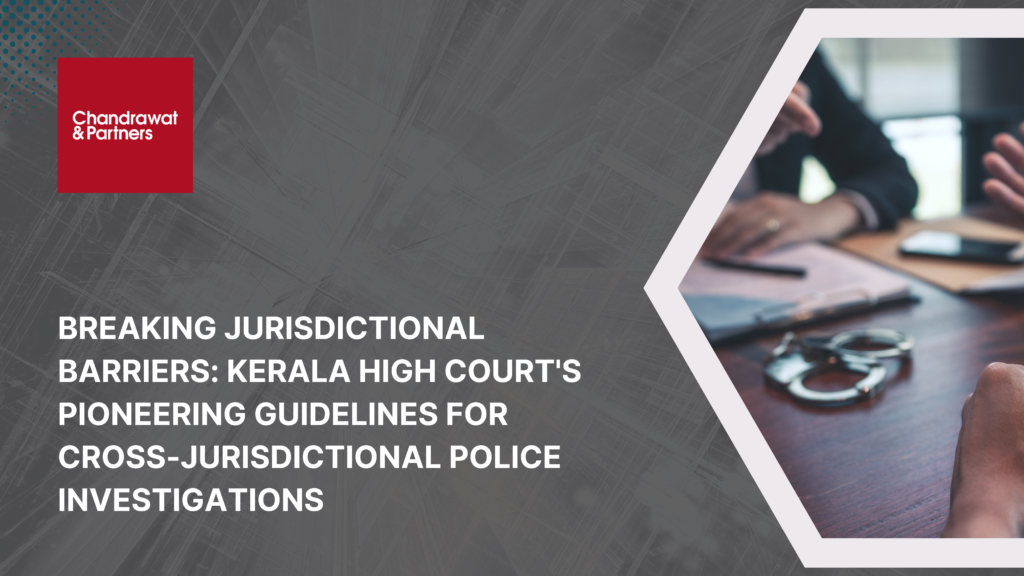
Share :
Breaking Jurisdictional Barriers: Kerala High Court’s Pioneering Guidelines For Cross-Jurisdictional Police Investigations
In today’s digital age, where crimes easily cross geographical boundaries, the issue of jurisdiction in law enforcement has become increasingly complex. Recently, in Noel Joseph v. State of Kerala, the Kerala High Court took a significant step in addressing this challenge by establishing comprehensive guidelines for police officers investigating cognizable offences committed beyond the territorial jurisdiction of their police station. This landmark decision not only clarifies procedural ambiguities but also emphasizes the importance of ensuring justice irrespective of geographical constraints.
Understanding Territorial Jurisdiction
Before delving into the specifics of the Kerala High Court’s guidelines, it is essential to understand the concept of territorial jurisdiction concerning police stations. Territorial jurisdiction refers to the geographical area within which a particular police station has the authority to investigate and initiate legal proceedings for offences committed within its boundaries.
Challenges Faced by Law Enforcement
In today’s interconnected world, criminal activities frequently transcend the confines of a single jurisdiction. Advancements in technology and transportation enable perpetrators to commit crimes in one area while residing or operating from another. This poses significant challenges for law enforcement agencies tasked with effectively investigating and prosecuting such offences.
Case Particulars
The accused, facing charges under IPC Sections 376 and 34 for rape, sought to quash the investigation report, arguing that the Vizhinjam Police Station lacked jurisdiction to investigate a crime committed in the Ernakulam district. However, the Kerala High Court, referencing precedents such as Rasiklal Dalpatram Thakkar v. State of Gujarat and Satvinder Kaur v. State, ruled that police officers have the authority to investigate cases beyond their territorial limits, especially when directed by the court under Section 156(3) of the CrPC, 1973. The Court emphasized that procedural irregularities do not invalidate the investigation and affirmed the jurisdiction of the Ernakulam court, where the case is pending.
In dismissing the petition, the Court upheld the legality of the investigation conducted by the Vizhinjam Police, finding no prejudice to the accused. It reiterated the duty of police officers to investigate cognizable offences after the filing of an FIR, as mandated by law. Additionally, it underscored that the jurisdiction for trial lies with the court where the offence occurred, thereby affirming the Ernakulam court’s jurisdiction over the matter.
Kerala High Court’s Ruling
The Kerala High Court outlined specific guidelines to address jurisdictional challenges faced by law enforcement:
- Recording Information: A police officer in charge of a station, regardless of jurisdiction, is authorized to record information about the commission of a cognizable offence.
- Extensive Powers: The powers of a police officer in charge of a station are as extensive as those of a court within the station’s local area, with authority to inquire into or try offences.
- Jurisdiction of Criminal Courts: A criminal court can inquire into or try an offence only if it was committed within its jurisdiction.
- Forwarding FIRs: If a police officer records the commission of a cognizable offence outside their jurisdiction, the recorded FIR must be forwarded to the police station that has jurisdiction.
- Investigation Across Jurisdictions: There is no absolute prohibition against an officer investigating an offence committed outside their local jurisdiction.
- Challenging Investigations: Once an investigation has started, it cannot be challenged in court on the grounds that the investigating officers lacked jurisdiction.
- Reporting Investigations: If a police officer investigates an offence committed outside their jurisdiction, they must submit the results of the investigation as per Sections 168, 169, and 170 of the CrPC, 1973.
- Forwarding Accused: After completing an investigation beyond their jurisdiction, the police officer must forward the accused (or secure their appearance if the offence is bailable) to the Magistrate empowered to take cognizance of the offence, as outlined under Section 170 of the CrPC, 1973.
- Court’s Role: Upon receiving a complaint about the commission of a cognizable offence, the court can verify jurisdiction and forward the case to the appropriate police station for FIR registration and investigation. The officer in charge of that police station must register and investigate the crime, even if the offence occurred outside their territorial limits.
Moving Forward: Redefining Jurisdiction in Law Enforcement
In an era marked by unprecedented interconnectedness and mobility, the concept of jurisdiction in law enforcement must evolve. The Kerala High Court’s proactive stance in establishing guidelines for cross-jurisdictional police investigations sets a commendable precedent for other jurisdictions to follow. By embracing technological advancements, fostering interagency collaboration, and upholding legal and ethical standards, these guidelines usher in a new chapter in the pursuit of justice—one where boundaries do not constrain the quest for truth and accountability.
For more information or queries, please email us at
enquiries@chandrawatpartners.com



